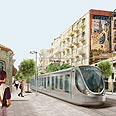
Jerusalem light rail train (simultaion)
Photo: Icon Massmedia
The ultra-Orthodox community opposes the Jerusalem light rail train. The Haredi population’s Rabbinical Transportation Committee approached Knesset members and ministers this week in a request to reconsider the routes for the capital's light rail train.
“In our meeting with transportation experts it became clear that the Transport Ministry is planning on cancelling a large part of the haredi lines that exist in the city,” the committee stated in a letter written a month and a half ago.
Extreme Measures
Meah Shearim residents agitated following wave of arrests of 'modesty guard' activists. In one of demonstrations held every evening, youngsters flip over police car in capital. 'The chastity squad activists are doing what the police should be doing,' senior community member says
According to them, the goal is to “force the ultra-Orthodox population in specific neighborhoods to take the light train and in other neighborhoods to ride the regular lines.”
The committee’s various rabbis also wrote in the letter, “We conclude that the light train is not at all suitable for the ultra-Orthodox community’s needs, neither worldly nor spiritually. The goal of forcing the ultra-Orthodox community to use the light train constitutes a severe spiritual danger.
“The Transport Ministry intends on altering the bus routes that serve the general public and move them to the Geula neighborhood and thus, to completely ruin the neighborhood’s spiritual character.”
The rabbis warned that due to limitations on the entrance of private vehicles into the city center, the Geula neighborhood will turn into a parking area for all those coming to the center. This is likely to increase the traffic on the neighborhood’s narrow streets and occupy the residents’ parking spaces.
In addition, they expressed a fear regarding the cancellation of the “kosher” bus lines that operate in Jerusalem and on which there is a separation between men and women.
Their biggest worry is the cancellation of bus 49A from the Neve Yaakov neighborhood which, in their opinion, greatly contributed to the prosperity of the haredi population in this northern suburb.
The Rabbinical Transportation Committee members concluded that the 160,000 haredi residents living in Jerusalem are liable to be negatively affected by the expected changes in transportation.
“There are those who will call this ‘a disaster for ultra-Orthodox Judaism,’ and those that will express themselves with greater severity. What is clear is that this is a huge step backwards on a worldly and spiritual level alike.”















